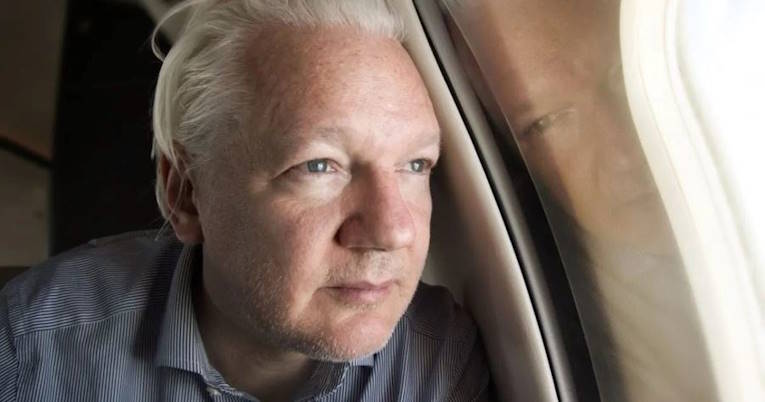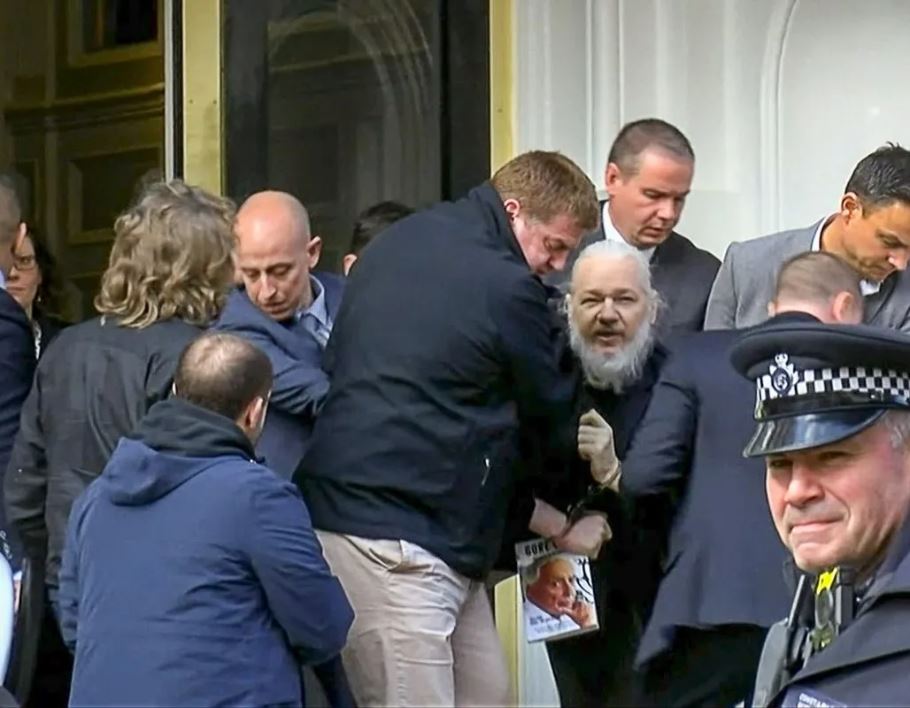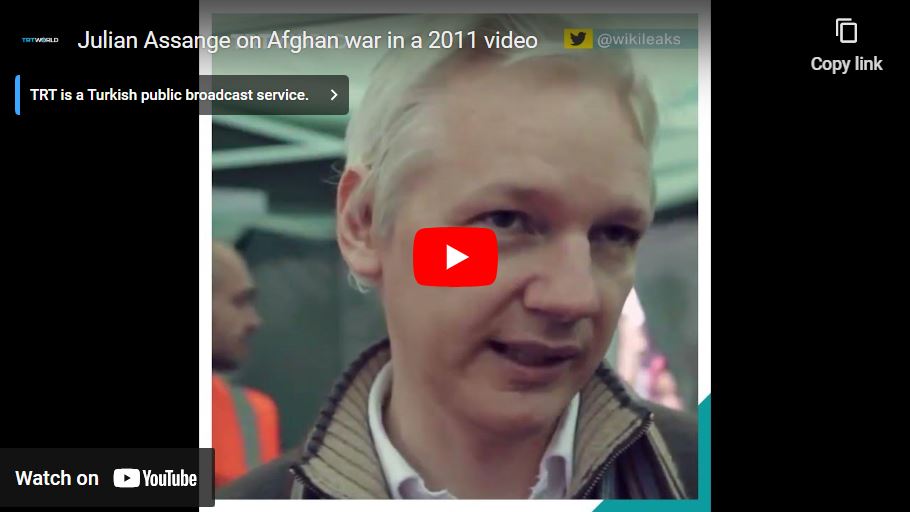
Assange: Hero or Villain?
It depends, doesn’t it?
By Brian Almon
Yesterday afternoon, news reported that Julian Assange had agreed to a plea deal that would allow him to go free after five years in a British prison. Prior to that, he spent seven years in the Ecuadorian embassy in London, evading attempts by British and American officials to capture him.
Free for the first time in 12 years. Photo by Al Jazeera.
What was his crime? Depending on who you ask, he either released sensitive classified information that put US troops and citizens at risk, or he exposed a corrupt government that was lying to its people. Where you fall on that question might depend on which generation you represent.
Governments have always held secrets, but it was after World War II that spycraft went into overdrive. The CIA, NSA, and the very idea of classified materials came from the necessity of fighting the Cold War against the Soviet Union. They were spying on us, we were spying on them, they were spying on our spies, and we were spying on theirs. Exposing secrets could mean the failure of a covert mission or even the loss of American lives.
In 1967, Secretary of Defense Robert McNamara commissioned a study into the ongoing conflict in Vietnam. The result was a series of top secret documents which contradicted official statements from President Lyndon Johnson and Congress about the nature of the war, including candid admissions about how much the CIA was involved in the assassination of South Vietnamese president Ngo Dinh Diem.
The Pentagon Papers were never meant to be public, but Daniel Ellsberg, an aide to one of the architects of the study, leaked them to the New York Times, which began publishing them in 1971. President Richard Nixon attempted to stop the publication, not because they implicated him — he was not in office during the time covered by the papers — rather, he felt that they would damage the ability of the government to conduct secret operations in the future.
The Nixon Administration authorized a break in of Ellsberg’s office, hoping to find something with which to discredit him. Ironically, this led to a mistrial, and Ellsberg was never convicted of violating the Espionage Act. The so-called Plumbers (tasked by Nixon to stop leaks) would eventually set off the Watergate scandal that led to Nixon’s resignation.
For conservatives who lived through the Cold War, men like Ellsberg, Assange, and Edward Snowden are clearly traitors. They released information that embarrassed the government and endangered American covert operations, and who knows how many American lives were lost or put at risk by their actions. If you believe that patriotism means supporting your country, and your government, whether right or wrong, then these men were clearly in the wrong and deserved to be prosecuted.
Others see things differently. If our government has gone awry, then shouldn’t patriotism motivate whistleblowers to expose it? How many secrets should our government keep from us, anyway?
Julian Assange cofounded WikiLeaks in 2006 as an open source depository for government secrets he believed should be exposed. He wrote at the time:
The more secretive or unjust an organization is, the more leaks induce fear and paranoia in the leadership and planning coterie. This must result in minimization of efficient internal communications mechanisms (an increase in cognitive ‘secrecy tax’) and consequent system-wide cognitive decline resulting in decreased ability to hold onto power as the environment demands adaptation.
In other words, if governments didn’t have anything embarrassing to hide, then they wouldn’t have to worry about people leaking their secrets.
In 2010, WikiLeaks published a series of leaks suggesting US troops were involved in killing civilians in Iraq as well as secret diplomatic cables which exposed many candid opinions that contradicted public statements. It was during this time that the nation of Sweden charged Assange with sexual assault, which was potentially cover for an American operation to capture the man who was now making a habit of embarrassing the government.
Assange escaped arrest and eventually requested asylum in Ecuador, which was granted. However, there was no way for him to get out of the country, so he took up residence in the Ecuadorian embassy from 2012-2019, when the nation revoked his asylum under US pressure.
 Julian Assange was dragged out of the Ecuadorian embassy by British police in 2019
Julian Assange was dragged out of the Ecuadorian embassy by British police in 2019
Then Secretary of State Hillary Clinton is alleged to have asked why they couldn’t just drone Assange. President Trump’s CIA Director Mike Pompeo reportedly entertained a plan to have Assange assassinated. What is so important about the secrets he exposed? With the benefit of hindsight we can see that the War on Terror had very little to do with protecting the American people and more to do with laundering money and maintaining the power of the military / industrial complex. Calling Assange a “traitor” because he exposed that nonsense seems short sighted.
Early in his embassy exile, Assange was tangentially involved with the flight of Edward Snowden, the former NSA contractor who exposed how our government was spying on American citizens. Snowden had met with journalists Laura Poitras and Glenn Greenwald in Hong Kong, and was then assisted by WikiLeaks volunteers to escape before he was captured. Assange made statements that led US intelligence to believe that Snowden would be flying on the official jet of Bolivian president Evo Morales. The US government pressured Italy, France, and Spain to close their airspace to Morales, forcing him to land in Austria where agents expected to capture Snowden, but it was a ruse. Snowden was on his way to Moscow, perhaps to eventually escape to Ecuador, but the Obama Administration canceled his passport, stranding him in Russia. He remains there to this day.
Assange said the Bolivian ruse exposed how European nations were not truly sovereign, but subjects of the American Empire.
Should America be an empire? Is it our proper role to be constantly playing a global game of chess, with other nations as pawns?
In 2011, Assange explained the purpose of the Afghan War:
Because the goal is not to completely subjugate Afghanistan. The goal is to use Afghanistan to wash money out of the tax bases of the United States, out of the tax bases of European countries, through Afghanistan, and back into the hands of a transnational security alliance. That is the goal — i.e. — the goal is to have an endless war, not a successful war.
Is this why the US intelligence community has been trying so hard to stop a single man?
I know old habits die hard. The same conservatives who considered Ellsberg a traitor for releasing negative information about the Vietnam War see Assange the same way for his role in discrediting the War on Terror. Take a step back, however, and ask yourself: Was it these men who discredited those conflicts, or were they dirty from the start?
Over the past three years we have seen our government take the intelligence tools they used to prosecute the Cold War and the War on Terror and turn them on the American people. In the 1960s, they saw college radicals and antiwar protestors as threats to the state, while today they see you and me, and anyone else who supports Donald Trump or just conservative principles in general as enemies of democracy. I believe that should give us an appreciation for men like Julian Assange who risked so much to expose the dirty deeds of powerful people.
I think one’s opinion of Julian Assange is a reasonable marker for where one stands in the ongoing transition of the Republican Party. Is he a villain, a hero, or just a symptom of our rapidly changing world? At the very least, his return to the news should once again spark a conversation about how much power we entrust to our government. Congress passed the Patriot Act in the wake of 9/11, saying they needed the tools to stop another attack, but now those tools are being used against us. Can this genie ever go back into the bottle?
